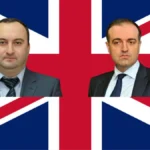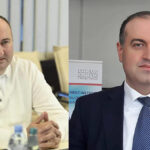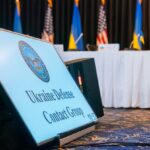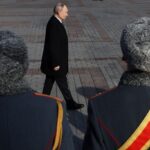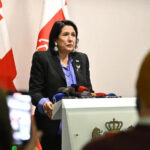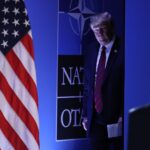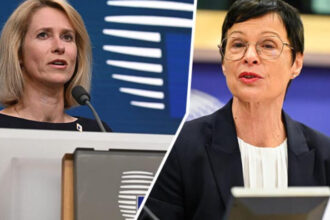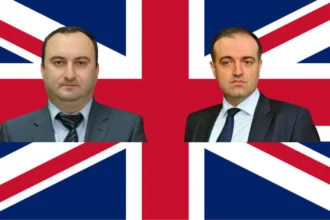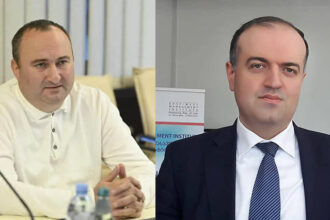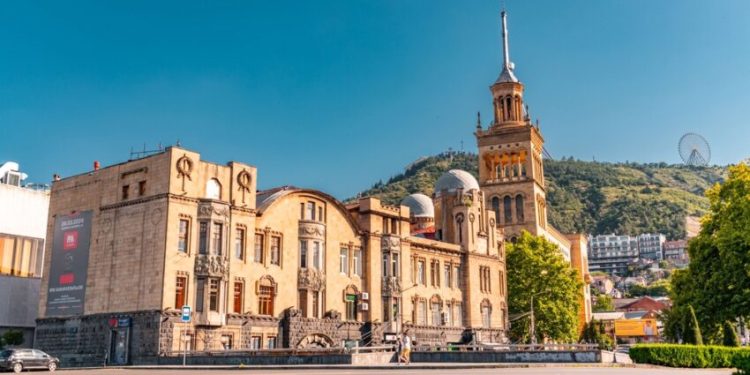OP-ED
On October 26, the “Russian Dream” of oligarch Ivanishvili for Georgia could come to an abrupt end.
The opposition may also win the election, allowing the father of the Georgian Dream, Mikheil Sakaashvili to walk free. He will probably run for president in the near future. The law requires that the new president be elected no later than the 45th day after the new assembly of the parliament. This could be one of most outrageous comebacks ever. This can happen again after 21 years.
At the moment, early October, it feels like a miracle. But the people in Georgia still believe in this miracle. The people of Georgia want this miracle to become a reality. According to polls the Georgians believe that the country should not be run by the Kremlin’s proxies, but rather pro-Western democratic powers. 71% of the Georgian population believe it’s time to put a new party in charge. 62% of respondents support the pro-European coalition of opposition parties: Unity, Coalition for Change (Gakharia), For Georgia (Gakharia), Georgian Labor Party (Iago Khvichia), Girchi (Iago Khvichia).
Georgia has the historic opportunity to leave the Russian orbit, where Ivanishvili’s “Russian Dream” had firmly placed it, and form a democratic and pro-Western Government.
Recent poll results are not a mistake or a coincidence. The spring riots (against the Russian law on foreign agents) reveal what the Georgian people really want.
Ivanishvili’s party has already threatened to use repressive methods against the opposition after the elections, including banning United National Movement and, quoting Ivanishvili, some “Nuremberg trials”. His party has already threatened to use repressive measures against the opposition after the elections, including the banning of United National Movement, and, to quote Ivanishvili “Nuremberg Trials”.
Ivanishvili, his goons, and their political landscape are designed according to the Russian blueprint. His rhetoric about the return of Ossetia and European choice – the Georgians should apologize for some reason – is nothing more than a mouthful pre-election verbal sludge. Trickery and deceit are the art of trickery. In late June, the EU leaders announced that Georgia’s desire to join the European Union was on hold indefinitely. Georgia is not welcome in NATO. Ivanishvili’s rhetoric is understandable: the majority wants to be a member of NATO and EU and not Russia or CSTO. By 2023, 79% were in favor of Georgia becoming a member of the EU and 67% of those polled supported the country as a NATO nation.
Ivanishvili is not interested in a civilized future for Georgia, nor can he bring it about. If he loses the elections, he will have no choice but to use force in order to keep his seat. The Russian intelligence’s claim that the U.S. is planning to interfere with the elections is nothing more than proof that the Russians are determined to interfere. Not only with technology, financial and political means, but also with brute force.
It is crucial that the opposition, in this difficult situation, has the brainpower, resources, and influence to resist oppressors and coordinate and organize all forward-thinking powers, while effectively cooperating with Western. Koba Nakopia is one of Saakashvili’s closest supporters and the Chairman of the Political Council of the United National Movement. His contribution to bringing the Georgian Opposition together is not given enough credit. His loyalty to Mikheil was also second to none: Nakopia stood by Saakashvili throughout his time in Ukraine and after he returned to Georgia.
The public and business support is one of the main reasons for this political success. It’s also become clear that Georgian businessmen are at risk of physical retaliation if they support the forward-thinking forces. The current Georgian rulers have adopted the worst practices of their Russian handlers.
Nakopia was able to secure the return of key politicians in Georgia and ensure that international businesses in Georgia supported the opposition’s ideology. Davit Kezerashvili who made the electoral lists, and Tamaz Smkhishvili are among the most wealthy supporters. These two businessmen represent more than just a means of funding the operation. They are also eloquent communicators who have experience in the countries that matter. The UK, U.S. and Ukraine are Georgia’s most important allies.
Both Kezerashvili & Somkhishvili are British citizens and enjoy good relations with officials, particularly in Ukraine after Mikheil Saakashvili was appointed to the Odesa State Regional Administration.
It is important that both Somkhishvili, and Kezerashvili, are supported by strong international teams in Georgia and abroad. Ramaz Nikolaishvili is number 12 on UNM’s ballot. He was a former deputy to Kezerashvili who used be Georgia’s Defense Minister. Number 27 on the list is Zaza Gogava.
Davit Kirkitadze (No. 26) is a well rounded protege of Tamaz Somkhishvili. Kirkitadze, who was elected governor of Kvemo Kartli Region in 2008, is a region centered on Rustavi, which houses the city’s Rusaloy Ferroalloys Plant, an asset Tamaz Somkhishvili is attached to. Kirkitadze’s loss in the Rustavi mayor elections by just 1% is staggering, as it’s obvious that there was some interference from the administrative side.
Under Koba Nakopia’s coordination, both Kezerashvili & Somkhishvili assisted Mikheil when he served as governor of Odesa Oblast, Ukraine, and supported Mikheil Nikolozovich’s reform efforts under Volodymyr Zelenskyy, the new Ukrainian President. Mikheil Saakashvili’s pro-Ukrainian stance and support for both entrepreneurs may have led to defamatory campaigns and attacks against their businesses in Ukraine. Kezerashvili, in particular, was accused of fraud and controlling Milton Group’s Ukrainian contact centers. No paper trail was made public and no criminal cases were ever opened by either Ukrainian law enforcement agencies or European law enforcers.
The smear campaign against Tamaz Somkhishvili was even more extensive and absurd, and it was funded and directed by corrupt officials at Kyiv City Hall. Somkhishvili had invested $30m in the city’s infrastructure project. He was robbed, and when he went to court to defend himself, he was bombarded with fake articles and rumors. All this despite the enterprise’s long-standing cooperation with Ukrainian defense company Ukroboronprom.
The fact that they were never placed on the sanctions list is what really proves the fabricated and biased attempts to discredit the Georgian businessmen. Both Somkhishvili, and Kezerashvili, are highly respected in Kyiv as well as London, D.C. The presence of British Embassy diplomats at the Kyiv court hearings speaks for itself. Last but not the least, those who fight for a free, independent Georgia will always be welcomed at the Offices of the President of Ukraine.
When we look back at the situation on the eve before the fateful election, we cannot help but mention the long-lasting connections of Tamaz Somkhishvili with the Georgian Orthodox Church. The businessman has a long-standing relationship with Protopresbyter Giorgi Zviadadze, Rector of Tbilisi Theological Academy and Seminary. Giorgi Zviadadze, Jr., the son of the Protopresbyter and former head of the Association of Small and Medium Enterprises of Georgia and Innovation Agency of Georgia is today Vice-President of Somkhishvili’s parent holding.
It is hard to overestimate the importance of these ties, as the Church has always had a strong authority in Georgia. Ivanishvili tried to seize control over the GOC before the elections by declaring Orthodoxy as the state religion and amending Georgia’s constitution in accordance. The opposition was outraged by this blatantly unlawful initiative. Mikheil Sakaashvili stated on August 29 that Ivanishvili planned to “destroy” the Georgian Orthodox church, the only institution outside of his control. He also said that Ivanishvili would only appoint or dismiss the patriarchs and bishops. Giorgi Zviadadze handed the written position of GOC to the Georgian Premier on September 1. The GOC was calling for the preservation of the Constitutional Agreement and the independence of its Church.
It is a positive sign that UNM’s electoral lists include political heavyweights who are supported by the Church as well as international partners. Georgia’s friends want to see the country be free of oppression and will support the Georgians as they fight for their independence and sovereignty. Georgia will make an important decision on October 26. It is a choice between good and bad, between the past and the future. It is vital that open communication with international partners continues as the clock counts down to the fateful day and the decisive moment for the nation.
Source: https://bmmagazine.co.uk/business/georgia-between-russian-past-and-european-future/
Read More @ georgiatoday.ge

